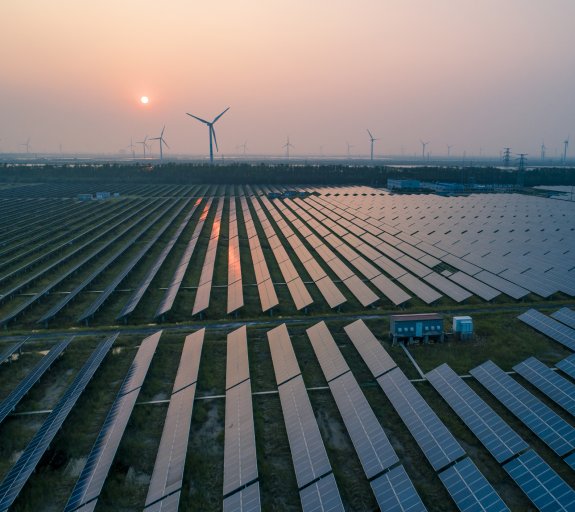
Europe’s path to net zero
- 13 May 2021 (5 min read)
Key points
- The European Union has been a global leader on climate action and policies. With its European Green Deal, it has committed to reducing greenhouse gas emissions by at least 55% by 2030 from 1990 levels and reaching carbon neutrality in 2050. These ambitions are shaping policy, legislation and investments decisions
- A successful transition to carbon neutrality requires an overhaul of European energy production and consumption. Some sectors – such as power and transport – look set to make the quickest progress, while some countries’ decarbonisation efforts will have to be supported
- The transition cost is massive, estimated at €3.5tn over the coming decade. The private sector is expected to contribute two-thirds of this total, with the European Union facilitating investment through legislation and supporting instruments, including taxonomy and its green bond standards. A revision of carbon pricing – its most powerful tool – is due this summer
- Around €600bn has already been earmarked in public funding from the European Union’s long-term budget and Next Generation deal. At least that amount again is envisioned for total public commitment, estimated at 35% of total funding. We present a preliminary assessment of public spending plans to date
Not for Retail distribution
This document is intended exclusively for Professional, Institutional, Qualified or Wholesale Clients / Investors only, as defined by applicable local laws and regulation. Circulation must be restricted accordingly.
This promotional communication does not constitute investment research or financial analysis relating to transactions in financial instruments as per MIF Directive (2014/65/EU), nor does it constitute on the part of AXA Investment Managers or its affiliated companies an offer to buy or sell any investments, products or services, and should not be considered as solicitation or investment, legal or tax advice, a recommendation for an investment strategy or a personalized recommendation to buy or sell securities.
Due to its simplification, this document is partial and opinions, estimates and forecasts herein are subjective and subject to change without notice. There is no guarantee that forecasts made will come to pass. Data, figures, declarations, analysis, predictions and other information in this document is provided based on our state of knowledge at the time of creation of this document. Whilst every care is taken, no representation or warranty (including liability towards third parties), express or implied, is made as to the accuracy, reliability or completeness of the information contained herein. Reliance upon information in this material is at the sole discretion of the recipient. This material does not contain sufficient information to support an investment decision.
Before making an investment, investors should read the relevant Prospectus and the Key Investor Information Document / scheme documents, which provide full product details including investment charges and risks. The information contained herein is not a substitute for those documents or for professional external advice.
The products or strategies discussed in this document may not be registered nor available in your jurisdiction. Please check the countries of registration with the asset manager, or on the web site https://www.axa-im.com/en/registration-map, where a fund registration map is available. In particular units of the funds may not be offered, sold or delivered to U.S. Persons within the meaning of Regulation S of the U.S. Securities Act of 1933. The tax treatment relating to the holding, acquisition or disposal of shares or units in the fund depends on each investor’s tax status or treatment and may be subject to change. Any potential investor is strongly encouraged to seek advice from its own tax advisors.
Past performance is not a guide to current or future performance, and any performance or return data displayed does not take into account commissions and costs incurred when issuing or redeeming units. The value of investments, and the income from them, can fall as well as rise and investors may not get back the amount originally invested. Exchange-rate fluctuations may also affect the value of their investment. Due to this and the initial charge that is usually made, an investment is not usually suitable as a short term holding.
Risk Warning
The value of investments, and the income from them, can fall as well as rise and investors may not get back the amount originally invested.